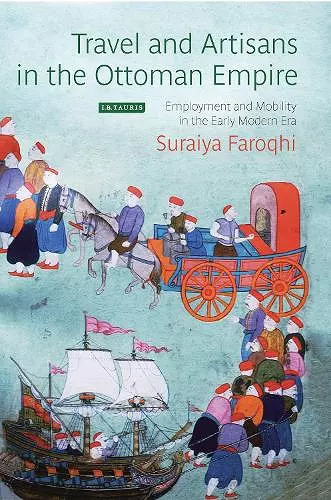Travel and Artisans in the Ottoman Empire
Employment and Mobility in the Early Modern Era
Format:Hardback
Publisher:Bloomsbury Publishing PLC
Published:31st Jan '14
Currently unavailable, and unfortunately no date known when it will be back

It has often been assumed that the subjects of the Ottoman sultans were unable to travel beyond their localities - since peasants needed the permission of their local administrators before they could legitimately leave their villages. Challenging existing historiography, this book is suitable for students and scholars of Ottoman history.
It has often been assumed that the subjects of the Ottoman sultans were unable to travel beyond their localities - since peasants needed the permission of their local administrators before they could leave their villages. According to this view, only soldiers and members of the governing elite would have been free to travel. However, Suraiya Faroqhi's extensive archival research shows that this was not the case; pious men from all walks of life went on pilgrimage to Mecca, slaves fled from their masters and craftspeople travelled in search of work. Most travellers in the Ottoman era headed for Istanbul in search of better prospects and even in peacetime the Ottoman administration recruited artisans to repair fortresses and sent them far away from their home towns. In this book, Suraiya Faroqhi provides a revisionist study of those artisans who chose - or were obliged - to travel and those who stayed predominantly in their home localities. She considers the occasions and conditions which triggered travel among the artisans, and the knowledge that they had of the capital as a spatial entity. She shows that even those craftsmen who did not travel extensively had some level of mobility and that the Ottoman sultans and viziers, who spent so much effort in attempting to control the movements of their subjects, could often only do so within very narrow limits. Challenging existing historiography and providing an important new revisionist perspective, this book will be essential reading for students and scholars of Ottoman history.
A series of windows through which we catch glimpses of people on the move (for many different reasons) in the early-modern Ottoman Empire. Faroqhi brings to this subject both her wide-ranging interest - from slaves and artisans to ambassadors - and her almost unrivalled mastery of Ottoman primary sources, both published and unpublished. The result is not a quantitative or systematic study of mobility but a rich and varied panorama, with many telling anecdotes. Professor Erik Zurcher, Leiden University "Suraiya Faroqhi has produced a mesmerizing study of a bustling empire on the move: ambassadors, wandering scholars and dervishes, renegade mercenaries, nomads, pilgrims, merchants, refugees, asylum seekers - and the great travel seventeenth-century travel fanatic Evliya Celebi. She has found space to chronicle the Turkish experience of such exotic places as Venice and Vienna and to survey such arcane trades as those of the firework manufacturers, scorpion catchers, donkey barbers and fez sellers. Her work, which is based on an unusually wide range of primary sources is also an important contribution to the study of international relations, as well as a guide to recent and impressive researches by Turkish historians in a dynamic and evolving field of study." Robert Irwin, author of The Arabian Nights: A Companion
ISBN: 9781780764818
Dimensions: unknown
Weight: 665g
320 pages